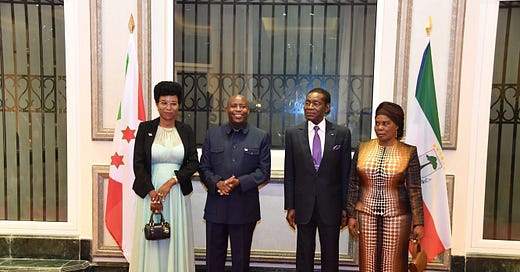The reasons that may be behind President Ndayishimiye's visit to Malabo
RegionWeek Newsletter Vol III, Issue #142 | Monday, November 2, 2020
This is a new version of the RegionWeek Newsletter for the 3rd season( July-December 2020). The content targets Business leaders, Decision-makers, and Young professionals with interests in Burundi and East Africa. Subscribe to stay productive, and competitive in a pandemic and disrupted season.
This Monday, President Evariste Ndayishimiye, and Firstlady Angéline Ndayishimiye started a 5-day state visit in Equatorial Guinea, Malabo.
At around 2:30 p.m. local Equatorial Guinea time, the plane carrying the President of Burundi on board, landed.
At the foot of the runway at the presidential airport of Malabo, the Presidential couple was received by the Equatorial Guinean vice-president Teodoro Nguema Obiang Mangue.
President Evariste Ndayishimiye said he was responding to the invitation of his Equatorial Guinean counterpart, Teodoro Obiang Nguema Mbasogo.
“The aim of the visit is to strengthen our bilateral relations. We have concluded cooperation agreements in the areas of socio-economic development, education, scientific research, culture, etc. We will look forward to implementation, ”he said.
The last time a Burundi President visited Equatorial Guinea was in 2012 when late President Nkurunziza was received by President Teodoro Obiang Nguema Mbasogo.
The event took place at Bata International Airport where a remarkable military parade of the Army, Air, and Navy was carried out attended by various government figures of the Republic of Equatorial Guinea, led by the Prime Minister, Ignacio Milam Tang.
The reasons behind the state visit in Malabo
Following the arrival in Equatorial Guinea of the President of Burundi, Evariste Ndayishimiye, the delegation of Burundi and that of Equatorial Guinea have begun work on the sectors in which Equatorial Guinea and Burundi wish to expand their cooperation and that could be signed at this official visit of the Head of State of Burundi to Malabo.
On table there are several agreements that includes the reciprocal visa exemption for holders of diplomatic and service passports, the memorandum of understanding on diplomatic consultations, the reciprocal promotion and protection of investments and the commercial agreement in the maritime transport sector.
The Equatorial Guinean delegation was headed by the Ministry of Foreign Affairs and Cooperation, Simeón Oyono Esono Angué, accompanied by the Minister of Agriculture, Livestock, Forests and the Environment, Francisca Eneme Efua.
The Burundi delegation was led by its Minister of Foreign Affairs, Alberth Shingiro, accompanied by the Minister of Agriculture, Deo Guide Rurema and the Minister of Transport, Industries and Tourism, Inmaculada Ndabaneze, as well as the Minister of Health and the fight against AIDS , Traddee Ndikumana.
Beyond official reasons
According to RegionWeek Analysts, President Ndayishimiye's visit to Equatorial Guinea is not a light strategic choice or a simple coincidence, especially after talk with President Magaufuli on Burundi mineral ressources reserach and investment.
In April 2019, late President Nkurunziza recieving the credentials letter of Malabo’s Ambassador Mr. Samuel Ateba Owono Iyanga, held discussion focused on how Burundi can emulate the Guinea Equatorial Model noting how not long ago the Equatorial Guinea was poor, but that following the exploitation of mineral sources and oil, the country is developing very quickly.
Equatorial Guinea is the third-largest oil producer in Sub-Saharan Africa. From 2000 to 2010, the country had the highest average annual increase in GDP (Gross Domestic Product), 17%
Equatorial Guinea has long been talked about for its human rights abuses and repression, thus establishing itself as a pariah state, a image that the international opinion have percieved about Burundi in the last five years.
Today, however, Equatorial Guinea has managed to improve the perception of the main Western financial and diplomatic bodies, in particular by establishing itself as an oil state on the international scene and by negotiating partnerships with large international firms.
Can this radical turn that Equatorial Guinea has made inspire Burundi struggling diplomacy and economy? The new oil wealth enables Malabo to dominate regional dynamics in the Gulf of Guinea, how can Burundi leverage its ressources to to establish new relations?
International connections have offered Malabo new levers, and the possibility of weighing more heavily on the regional and international scenes, while Equatorial Guinea's relations have always been strained with its immediate neighbors (Nigeria, Gabon, Cameroon).
Currently, President Obiang Nguema is making significant efforts to build an international stature. RegionWeek Analysts believe that apart cooperation agreements that will certainly discussed, they anticipate strategic advices from Mbasogo to his Burundian counterpart.
The Bottom line
Equatorial Guinea now attracts much more cooperation from Europeans and Americans, despite the continued reluctance of the International Monetary Fund. Obiang Nguema sought international legitimation, which is directly linked to his desire to attract foreign direct investment. Will Gitega follow the Malabo Model?
Wait and see!
Thanks for reading
Fabrice Iranzi, RegionWeek.com
Support RegionWeek Newsletter!
Contribute at least $5/Month, and join our amazing community of supporters!
RegionWeek is a Burundi-based media for a new generation of achievers in Africa, a platform devoted to chronicling the journey to Freedom and Empowerment.





